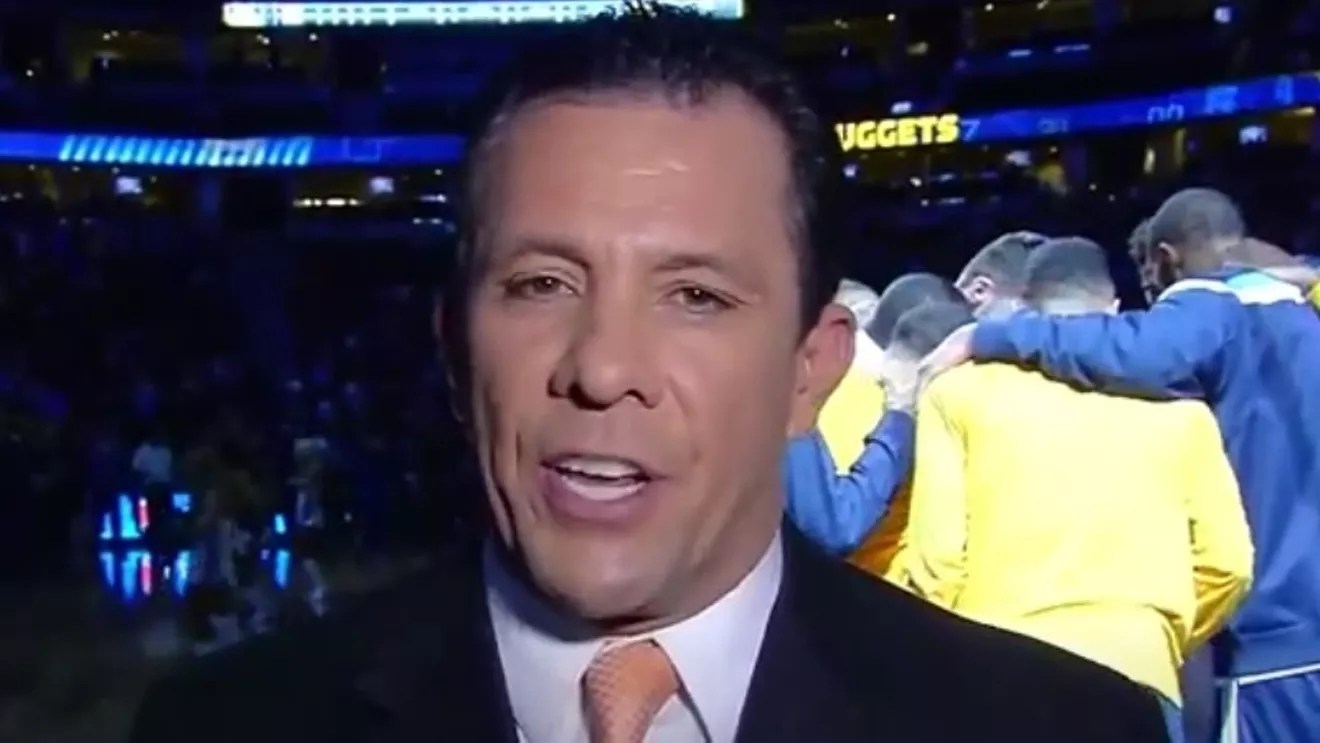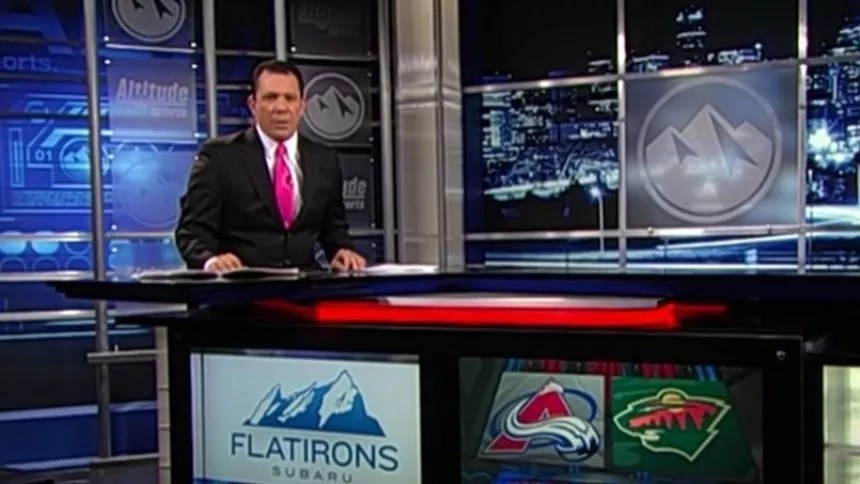
Altitude TV via YouTube

Audio By Carbonatix
Veteran sportscaster Todd Romero’s lawsuit against Altitude TV is very much alive, despite the broadcaster’s efforts to kill it.
In March 2021, Romero sued the network, his employer of nearly a decade, for allegedly discriminating against him because of race, age and his decision to seek treatment for prescription-drug dependency. However, he continued working for Altitude, the broadcast home of the Denver Nuggets and the Colorado Avalanche, on a non-contractual basis, despite what he saw as the company’s efforts “to demean me and make me feel less than” until this past October, when he was informed that his job had been eliminated in a company-wide cost-cutting measure.
At the time of Romero’s exit, lawsuit defendants Altitude Sports & Entertainment and Kroenke Sports & Entertainment (owned by gazillionaire Stan Kroenke, whose portfolio also includes the Nuggets and Avs) were pressing U.S. District Court Senior Judge Christine Arguello to throw out the complaint by way of a motion for summary judgment. But on January 8, Arguello issued an order that was essentially a slam dunk for Romero. All nine major claims made by Romero’s attorney, Campbell Litigation‘s Stacey Campbell, were found worthy of being considered at trial. The only allegation nixed by Arguello pertained to Romero’s allegations related to Altitude’s decision not to renew his 2016 contract, and only because she ruled that he should have filed a discrimination charge on that issue sooner.
The order puts Altitude and Kroenke Sports in the position of either reaching a settlement with Romero or allowing him to air his grievances in public court – a risk made even larger by the fact that compensation under the racial-discrimination clause of the 1964 Civil Rights Act, a key to the suit, is uncapped.
Are negotiations in the offing? Carolyn Thesis and Joshua Kirkpatrick of Denver’s Littler Mendelson P.C., the law firm representing Altitude and Kroenke Sports, have not responded to inquiries from Westword, and Campbell says only that “Mr. Romero is pleased the court has reviewed the summary judgment motion and allowed all of his claims to move forward to a jury.”
In his original Altitude TV bio, Romero, who’s in his late fifties, notes that he was born in the Mile High City, raised in Fort Collins, and graduated from the University of Denver in 1986 with a degree in mass communications and journalism. He subsequently spent five years on the staff of 9News before leaving Colorado for TV gigs in Kansas City and Orlando, as well as a position with World Wrestling Entertainment. He returned to the state in 2012, when Altitude offered him the opportunity to cover the Nuggets, one of his favorite teams since childhood. And that’s not all. An excerpt from the lawsuit notes that he “has hosted pre- and postgame shows for the Nuggets and Avalanche, [and] provided play-by-play analysis for high school football and for the University of Denver men’s and women’s basketball teams.”

Todd Romero during his stint on Altitude TV.
Altitude TV via YouTube
Although Romero won an Emmy award as part of the 2018 Nuggets broadcast team and received two nominations in 2019, his status with Altitude TV changed during this period. In January 2016, Romero signed a two-year pact with an option for a one-year extension through January 2019; he earned $95,481 in year one and $98,345 in year two, with $101,295.55 earmarked for the potential year three. But after the contract expired, the complaint states, he was told that he and other Altitude talent would be moved to “at-will employment instead of contracts.”
According to the suit, that wasn’t true: The document contends that at least seven of Romero’s co-workers received contracts – all of them “non-Hispanic, non-brown-skin colored, and/or non-disabled/regarded as disabled.”
This last assertion references Romero’s decision in the summer of 2016 to use accrued vacation time to enter a rehabilitation facility because he’d become addicted to sleeping medication he was prescribed after hurting his neck. The suit argues that despite kicking his habit and returning to work, Romero was treated like damaged goods from that point forward. In subsequent years, his face time ebbed. Rather than being allowed to continue with his Nuggets hosting duties during the 2020-2021 NBA season, the suit says he was “relegated to appearing in feature stories, which are typically four- to five-minute pre-recorded video pieces aired during the pre-game show of the Nuggets game’s broadcast.”
In the motion for summary judgment, Altitude and Kroenke Sports blasted the lawsuit’s suggestion that this decision and others like it are evidence of discrimination. Romero “was simply not Altitude’s ‘starting quarterback,'” the motion says. “While Plaintiff wanted hosting and play-by-play opportunities, feature work was best suited to his strengths.” In addition, the motion says he was bumped from hosting a program called Sports Social in part because he “did not have as strong a social media presence as other talent,” and during a July 30, 2020, guest appearance on the show, he was allegedly “in such a visibly altered state that Altitude made the business judgment not to air the program.”
This reference alludes to Romero’s relapse regarding controlled substances, which his lawsuit attributes to “severe emotional distress” caused by the “persistent discriminatory treatment” to which he had been subjected. He returned to rehab shortly thereafter – a stint that was successful.
Campbell believes that Romero’s ouster in October 2022 was connected to his lawsuit against Altitude and Kroenke Sports, particularly given that his client was asked to waive his claims against the companies at the time his employment was terminated. Romero declined to do so.
Judge Arguello has set aside two weeks in March for Romero’s case to be heard in her courtroom, and Campbell says he and his client are looking forward to putting the story before jurors. At this point, only a settlement will prevent that from happening.
Click to read Todd Romero v. Altitude Sports & Entertainment, et al., as well as the motion for summary judgment and the January 8 order.